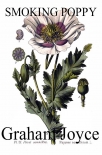Smoking Poppy - Graham Joyce (the best electronic book reader TXT) 📗

- Author: Graham Joyce
Book online «Smoking Poppy - Graham Joyce (the best electronic book reader TXT) 📗». Author Graham Joyce
But then one day I was a downright idiot, a peasant. I don’t know how it happened, but it seemed that overnight, maybe around the time that Charlie was twelve or thirteen, I’d gone from being the wonderful, all-powerful fixer to being a complete chump, with no transitional stage. From being the oracle of wisdom it seemed that now everything I had to say was pure tomfoolery, to be derided in that feminine way girls and women have of insulting you without it seeming – initially anyway – to bite.
And while I was walking through the jungle with my head down I was trying to remember the exact day, the first time this happened. The dividing line. Maybe that’s what I was doing here: trying to be the fixer again.
‘Hey! Look at that!’ Mick cried
We stopped dead in our tracks. Mick pointed at the gnarled branch of a tree. The tree itself was utterly without foliage, but arrayed along one of its rotting branches, high in the sky, were seven sweet waxy white flowers, like a constellation of stars burning brilliantly against the far-inferior sun.
‘Orchid,’ Bhun said, nodding his head. It was the first English word he’d uttered since we’d met him.
‘He fixes the stars in heaven,’ Phil murmured, almost inaudibly.
‘Now that’s a sight worth coming here for,’ Mick said.
I wouldn’t have gone quite that far, and as I retorted something to that effect Bhun scrambled up the tree, his gymnasticism astounding, to pluck one of the orchids. When he dropped down again, he offered it to Mick.
Mick made as if to eat it, and the guides laughed. Then he put it behind his ear, fluttering his eyelids and making coy, suggestive faces. The guides laughed some more. ‘Sanuk!’ they shouted. ‘You sanuk!’
The tension between us eased somewhat. Mick began to point at some of the strange fruit we’d seen along the way.
‘Jackfruit,’ Bhun said.
‘Taste good?’
Bhun didn’t understand, so Mick tried again, holding his fingers to his mouth. ‘Jackfruit. Him good eating?’
I was glad to get my own back. ‘Him plenty-plenty good chop-chop.’
‘Fuck off.’
‘Bombast and Denial,’ Phil said heavily. ‘You’re children. Both of you.’
Late in the afternoon, exhausted and weary from the trail, we reached the first village where we were to overnight. The trees thinned as we dipped into a valley, and some of the area had been cleared for agriculture. On the valley floor in a natural basin clustered no more than fifteen huts. A dog barked in the village.
‘Lisu people,’ Coconut said, naming the tribe.
I took my bottle from my pack and glugged on my water. Not because I was especially thirsty, but to disguise my anxiety. We pressed on, passing sloping terraces tilled for growing what I took to be maize in the red soil. Further down a brightly coloured weed garden grew on a slope, in which a hovering and luxurious mass of stately red, white and purple flowers flared in the golden light of late afternoon.
Drawing abreast of the exotic, showcase blooms I suddenly realised what I was looking at. Phil hunkered down and put his eye up close to one of the flowers. It was as if he wanted to squint back at Satan. ‘There is a friend that sticketh closer than a brother,’ he said.
‘Poppy,’ said Coconut. ‘Opium poppy.’
20
The Lisu people inhabiting the village were not especially interested in us. I got the impression they’d seen plenty of gawping Westerners shuffling through on organised treks. The kids gathered to appraise us with huge, liquid eyes, but the adults got on with their domestic tasks as we slid off our backpacks outside a hut on the edge of the village. Coconut went in search of the headman. Mick drew a circle of kids around him when he started to hand out chewing gum and sweets. I must admit it hadn’t occurred to me to bring little gifts for the children.
For the Lisu women tribal costume was a colourful blue and red tunic worn over trousers, and some of the older women wore tasselled turbans. The men wore blue or green baggy trousers pegged at the ankles. I thought how healthy they all looked. Certainly the kids had good, shiny skin and strong white teeth. Their faces were more rounded than the somewhat heart-shaped faces of the Thais; later I learned that these people had migrated here from Tibet.
Coconut returned with the smiling headman. Despite our exhaustion we waid, and I remembered to offer him a cigarette. A deal was struck quickly and we were led to a pair of huts on stilts. Coconut was quick to point out that one hut was for us, and one was for them. The headman spoke to one of the assembled children, a boy of about seven. The lad trotted off, there was a brief squawk, and he returned holding a flapping chicken by its neck and legs. Bhun took a stainless steel dish from his backpack. Grabbing the flapping chicken he took out his long knife and beheaded the fowl, letting it bleed into the dish.
‘We cook for you now,’ Coconut said, rather unnecessarily.
‘Would you ask the headman,’ I said to Coconut, ‘if he knows of an English girl – a farang – living in one of the villages?’
Coconut frowned. ‘Look, they don’t speak Thai. I don’t Lisu. I can hut, I can chicken. That’s about all.’ He must have seen my face crash, because he added, ‘Sorry.’
Dusk was settling on the village as the headman and his boy left us to it. Our hut was made of bamboo, with a neatly swept rattan floor. A raised





Comments (0)